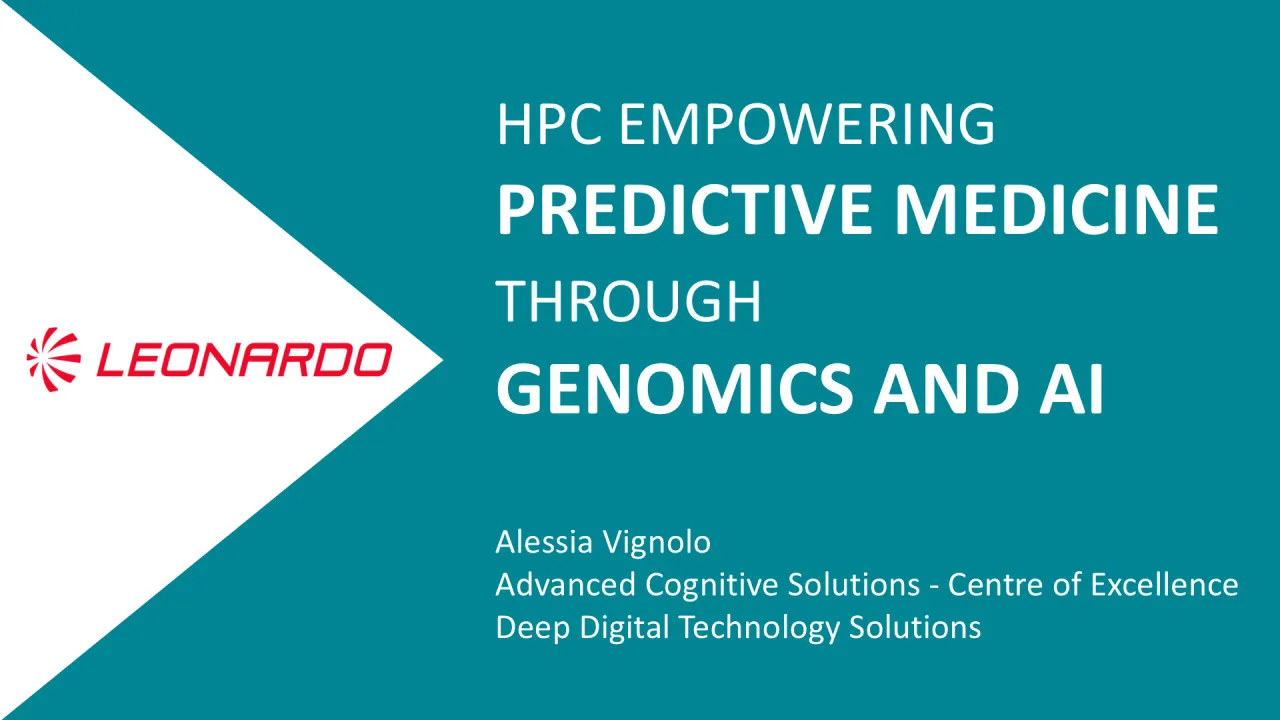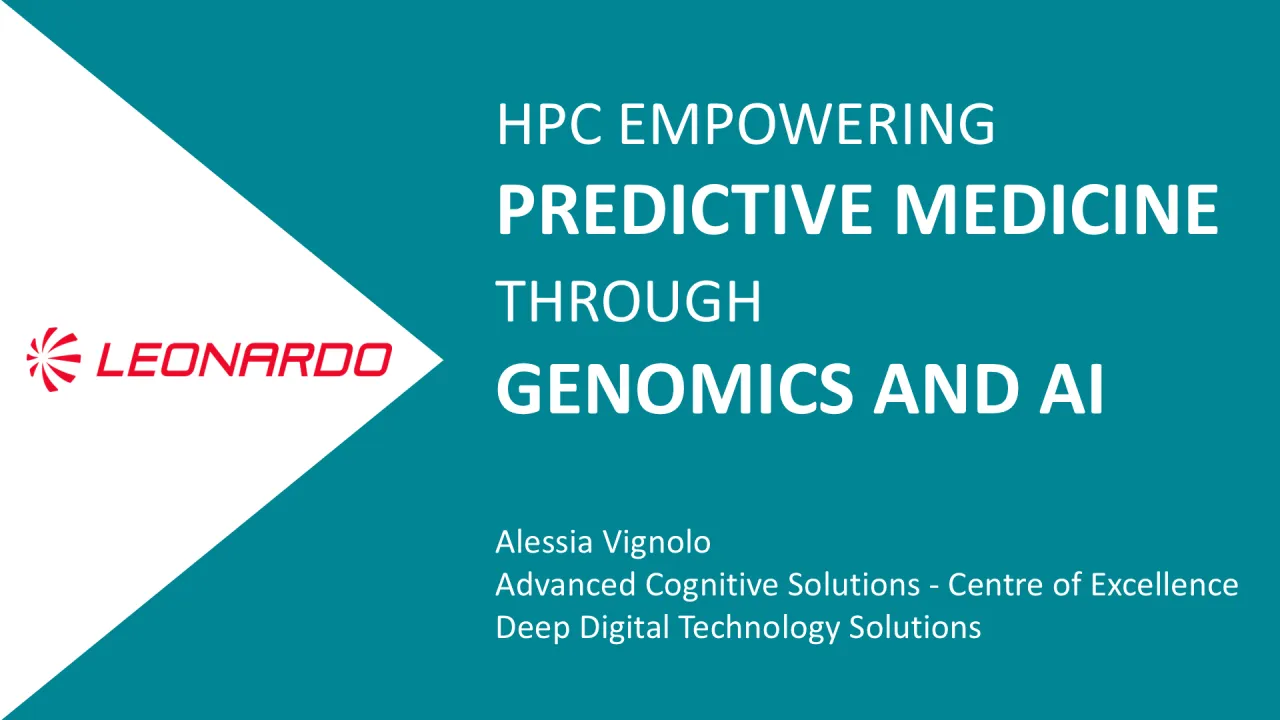

HPC Empowering Predictive Medicine Through Genomics and AI
Tuesday, June 10, 2025 3:00 PM to Thursday, June 12, 2025 4:00 PM · 2 days 1 hr. (Europe/Berlin)
Foyer D-G - 2nd floor
Project Poster
AI Applications powered by HPC TechnologiesApplication Workflows for DiscoveryBioinformatics and Life SciencesHigh-Performance Data Analytics
Information
Poster is on display.
Advancements in genomics and artificial intelligence (AI) are driving a new era in personalized and predictive medicine. By enabling the analysis of complex genetic and clinical data, these technologies offer unprecedented opportunities to identify disease risks, improve early detection, and guide preventive healthcare strategies.
Studies have shown that specific genetic mutations can be detected years before the onset of Acute Myeloid Leukemia (AML), highlighting the potential for early prediction. Building on these findings, the SInISA project (Integrated Genetic Screening and Data Governance System) focuses on developing a system that combines next-generation sequencing (NGS), bioinformatics analysis, and AI techniques to predict the risk of hematologic-oncologic diseases, particularly AML, in a prospective study.
A core element of this project is the deployment of bioinformatics and AI pipelines on the davinci-1, the High Performance Computing (HPC) infrastructure of Leonardo, which provides the computational power required to efficiently handle and analyze large-scale genomic datasets, offering high scalability and speed through parallel processing.
The bioinformatics pipeline begins with raw sequencing data from genetic laboratories in FASTQ format. These data undergo alignment to a reference genome, followed by variant calling and annotation to identify genetic mutations potentially linked to disease development. Results from the bioinformatics pipeline will be reviewed by geneticists and clinicians to verify the presence of clinically significant mutations and to identify genetic mutations that have been previously associated in the literature with disease development. Participants identified as being at increased risk will be notified, enabling clinical monitoring and regular follow-up assessments.
Complementing this, the AI pipeline integrates genetic findings from the bioinformatics analysis with clinical data, applying predictive models trained on literature data in order to assess individual disease risk.
Furthermore, a dedicated Data Lake will be established on davinci-1 to securely store and manage pseudonymized genetic and clinical data, ensuring seamless access for data analysis.
By combining cutting-edge sequencing technologies, HPC infrastructure, bioinformatics and AI-driven analysis, the SInISA project represents a significant step forward in precision medicine. The integration of these advanced technologies is expected to enhance early disease detection, inform clinical decision-making, and contribute to more effective prevention strategies.
Advancements in genomics and artificial intelligence (AI) are driving a new era in personalized and predictive medicine. By enabling the analysis of complex genetic and clinical data, these technologies offer unprecedented opportunities to identify disease risks, improve early detection, and guide preventive healthcare strategies.
Studies have shown that specific genetic mutations can be detected years before the onset of Acute Myeloid Leukemia (AML), highlighting the potential for early prediction. Building on these findings, the SInISA project (Integrated Genetic Screening and Data Governance System) focuses on developing a system that combines next-generation sequencing (NGS), bioinformatics analysis, and AI techniques to predict the risk of hematologic-oncologic diseases, particularly AML, in a prospective study.
A core element of this project is the deployment of bioinformatics and AI pipelines on the davinci-1, the High Performance Computing (HPC) infrastructure of Leonardo, which provides the computational power required to efficiently handle and analyze large-scale genomic datasets, offering high scalability and speed through parallel processing.
The bioinformatics pipeline begins with raw sequencing data from genetic laboratories in FASTQ format. These data undergo alignment to a reference genome, followed by variant calling and annotation to identify genetic mutations potentially linked to disease development. Results from the bioinformatics pipeline will be reviewed by geneticists and clinicians to verify the presence of clinically significant mutations and to identify genetic mutations that have been previously associated in the literature with disease development. Participants identified as being at increased risk will be notified, enabling clinical monitoring and regular follow-up assessments.
Complementing this, the AI pipeline integrates genetic findings from the bioinformatics analysis with clinical data, applying predictive models trained on literature data in order to assess individual disease risk.
Furthermore, a dedicated Data Lake will be established on davinci-1 to securely store and manage pseudonymized genetic and clinical data, ensuring seamless access for data analysis.
By combining cutting-edge sequencing technologies, HPC infrastructure, bioinformatics and AI-driven analysis, the SInISA project represents a significant step forward in precision medicine. The integration of these advanced technologies is expected to enhance early disease detection, inform clinical decision-making, and contribute to more effective prevention strategies.
Format
On DemandOn Site
Speakers

Alessia Vignolo
PhDLeonardo